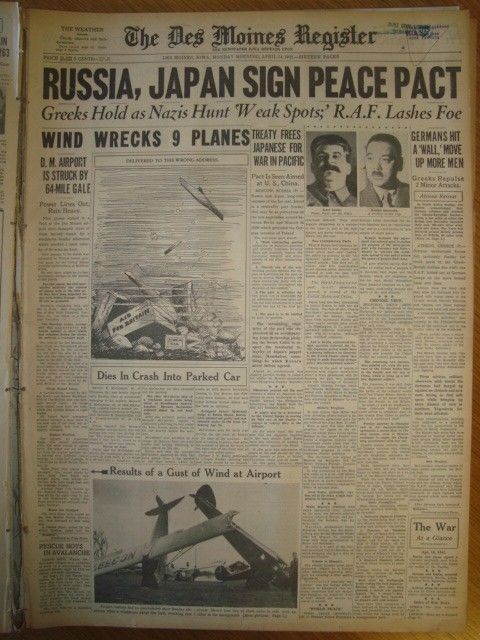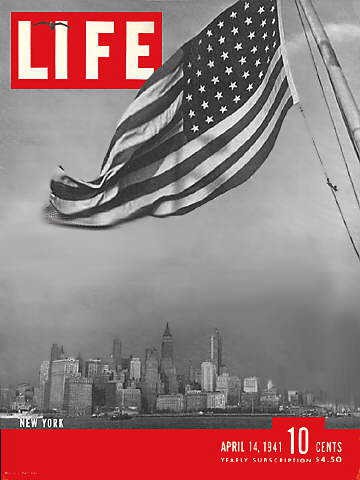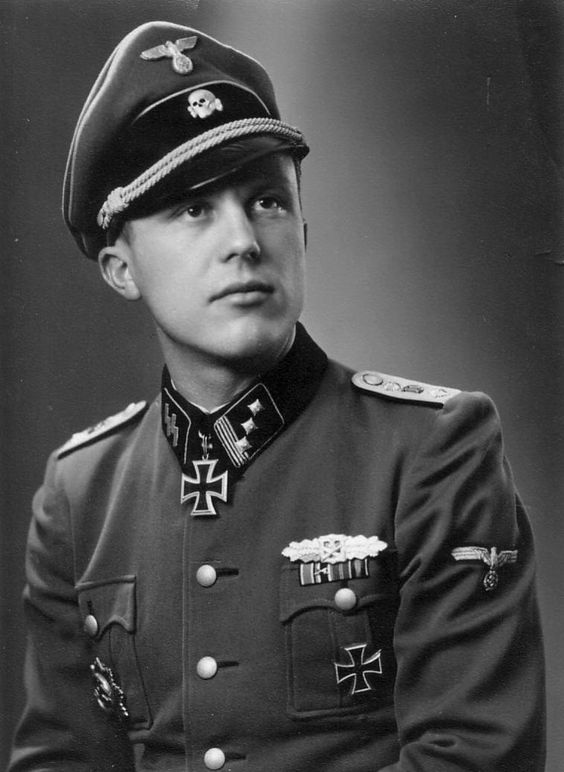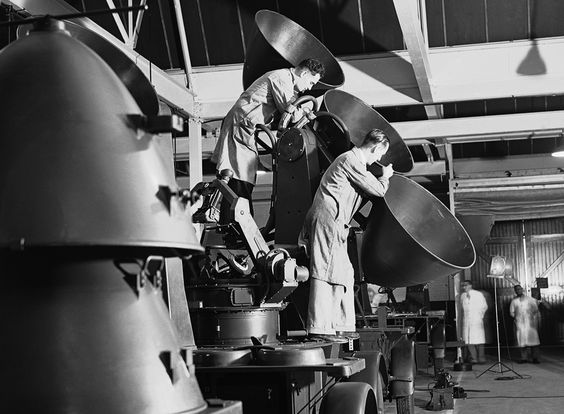Monday 14 April 1941
 |
| "The For'ard 14" guns of HMS KING GEORGE V firing during practice." April 1941. © IWM (A 3888). |
The spearheads of the 9th Panzer Division reach Kozani in northern Greece, which was the first main objective following the XL Panzer Corps' turn south. In addition, the Germans send some units across the Aliakmon River near Thessaloniki and take Katerini, which is only 6 km from the coastline. The British have pulled back slightly there, but remain in the vicinity to prevent further German advances.
The British strategy right now still is to stop the Germans, not to evacuate. They put forces into three main zones: the Olympus Pass, the Servia Pass, and the Platamon tunnel sector west of Olympus. In effect, the British have abandoned the Aliakmon Line even though they still have scattered units trying to hold it. The British organize "Savige Force" under Brigadier S. G. Savige with 1st Armored Brigade and 17th Australian Brigade to defend their left flank.
The Yugoslavian Zetska Division had been leading the advance to the west against the Italian positions in Albania, but the sudden appearance of German forces on its flank has compelled it to retreat. Today, it sits on the Pronisat River, watched carefully by the Italian 131st Armored Division Centauro. Because of this withdrawal, the Greek forces in Albania are now completely cut off. However, the Italians in Albania are very quiet.
The RAF bombs the Italian port of Valona (Vlore) with Swordfish torpedo bombers of RAF No. 815 Squadron. They sink 3329-ton Italian freighter Luciano and 1228 ton Italian freighter Stampalia. The British lose a Swordfish, with one man killed and two becoming prisoners.
 |
| King Peter arrives at a secret British airbase in northwest Greece at Paramythia. That is an Italian-made Savoia-Marchetti SM.79 Sparrowhawk. Peter is fourth from the left facing the camera, bare-headed and in a tweed jacket. (R.J. Dudman via Serbianna). |
King Peter's plane is escorted by a German-made Royalist Yugoslav Air Force Dornier Do17K of 209 eskadrila. It is a rare case of a Dornier Do 17 being used by the Allies, but not the only one, as Dornier exported several before the war. Prince Paul, due to his favoritism toward the Axis, had purchased 40 Savoia-Marchetti bombers from Italy and 69 Dorniers and numerous Bf 109s from Germany. Somewhat incongruously, the German planes were used against the Luftwaffe, with the Yugoslavs losing 4 Dorniers in the air and 45 on the ground. Two Dornier Do 17Ks escape from Yugoslavia and serve with the RAF in Egypt.
The Yugoslav government is under no illusions. It is considering asking the Germans for a ceasefire. Some accounts state that they request one late today.
British Col. Oakley-Hill, an old Albanian hand, has been trying to organize the Albanian resistance. With the situation rapidly changing, he is recalled. Resistance efforts, however, will continue.
The Luftwaffe damages British 7264-ton transport Clan Cummin at sea, then it hits a mine and sinks in Eleusis Bay northwest of Athens. While 36 men are rescued by the Allies, 77 become German prisoners.
 |
| Time Magazine, 14 April 1941 - Adolf Hitler - "Spring is Here." |
The RAF has a tragic accident when a Halifax bomber crashes at Tollerton, near RAF Linton on Ouse. The engineer apparently shuts off the engines accidentally. Two of the crew are injured.
Battle of the Atlantic: U-52 (Kptlt. Helmut Möhlmann), on its 8th and final patrol, torpedoes and sinks 6563-ton Belgian freighter Ville de Liège about 810 miles (1300 km) east of Cape Farewell, off southern Greenland. There are ten survivors. This is U-52's final victory, it will return to port after this and spend its remaining years as a training boat. During its eight patrols, it sank 13 Allied ships.
The Luftwaffe attacks shipping at Falmouth and bombs and sinks Free French Naval Forces gunboat Conquérante. Also sunk is French gunboat Suippe, which is later refloated.
German guard ship H 453 Gretchen sinks of unknown causes.
USS Gar (Lieutenant D. McGregor) is commissioned at New London, Connecticut.
 |
| The Des Moines Register, 14 April 1941. The big news is yesterday's Russia/Japan nonaggression pact. |
The position in Libya becomes worse, and Egypt is threatened. In Balkans, the Jugo-Slavs are going to collapse, and as the Greeks have not withdrawn their Albanian divisions, the Aliakhmon line will probably be turned and our Greek position rendered untenable.At the War Cabinet meeting, Menzies disagrees with Churchill's strategy to hold Tobruk as a rallying point. Menzies views the War Cabinet as "deplorable" and Churchill as a "dictator" who cows his ministers into submission. Menzies, who has been planning to leave for several decides, decides to remain for a couple more weeks to participate in "grave decisions" that will be made about his homeland's troops.
Today is the first coordinated German attack on Tobruk, and it is a complete flop. It starts well enough when German sappers cut defensive wires and fill in the Italian-built anti-tank ditch at 02:30. Then, supported by heavy machine-gun fire, they advance. At 04:30/05:20, 38 Afrika Korps tanks break through the first line of fortifications and into the Tobruk perimeter. Supported by Junkers Ju 87 Stukas, they make good progress at first. The Australian defenders, though, have been told to let the tanks pass so they can trap the accompanying infantry.
The British have artillery sited on the spot and knock out 17 of his 5th Panzer Regiment tanks of Group Olbrich (General Olbrich). The remaining panzers withdraw at 07:30 into the desert in disarray, but the 8th Machine Gun Battalion which follows them in is trapped. The 8th loses about 900 men to death or capture, leaving it with a strength of only about 300 men (casualty estimates for this action vary widely, but those figures are from the Germans themselves, though they may include some earlier casualties, too). General Rommel is furious at the failure to capitalize on the initial breakthrough and will sack General Streich, commander of the 5th Light Division, as a result.
The German prepare for a siege. They bring up the Italian Trento Division and put it under the command of the Brescia Division. They also put Detachment Schwerin in the line, along with most of the 5th Light Division. A second attack scheduled for 18:00 is canceled, an indication of the depth of the fiasco in the morning. The Afrika Korps also goes over to the defense of Bardia/Sollum/Sidi Oma. The RAF has complete air superiority, and forward Detachment Knabe is bombarded by Royal Navy gunboat HMS Gnat and its accompanying two destroyers in the Bay of Sollum. Royal Navy gunboat HMS Aphis bombards Bardia.
The Luftwaffe is doing what it can. It attacks the Gnat in the Bay of Sollum and badly damages it, killing one sailor. The Gnat makes it to port in Mersa Matruh, then proceeds to Port Said. Lieutenant General Rommel requests control over Luftwaffe operations in Libya by X Fliegerkorps.
The Luftwaffe bombs and sinks 2485-ton Turkish freighter Trabzon off Laurium/Lavrio/Lavrium (about 60 km southeast of Athens and north of Cape Sounio).
Royal Navy auxiliary tanker RFA Pericles, which had been damaged during the Luftwaffe bombing of Suda Bay, Crete, sinks (it breaks in half) while en route to Alexandria. Everyone aboard survives.
Royal Navy submarine HMS Taku is proceeding from Gibraltar to Malta, along with fellow submarines Torbay and Undaunted, when a torpedo - apparently launched by an Italian submarine - is spotted coming toward it. Taku takes evasive action and avoids the torpedo. Apparently, because of this incident, the Admiralty (CinC Mediterranean) orders Taku and Torbay back to Gibraltar for other missions.
Convoy AN 27 (four British and six Greek ships) departs from Port Said bound for Suda Bay, Crete. The ships carry reinforcements and supplies for the troops in Greece.
Australian Corporal John Hurst Edmondson earns a posthumous VC when, while badly wounded during a bayonet charge in the morning darkness, he saves the life of his commanding officer.
Battle of the Indian Ocean: British ammunition ship Fort Stikine catches fire and in Bombay Harbor and explodes in a massive fireball. The blast wave destroys the docks, sinks four nearby ships, and damages 11 others. It explodes again half an hour later. A total of 231 men are killed in the explosion, with another 476 men injured, but the devastation is far worse: an estimated 1000 people simply vanish and 2000 are hospitalized. The Fort Stikine was carrying 124 gold bars, of which all but one remain unrecovered.
Battle of the Pacific: The US Marines garrison Palmyra Atoll (due south of the Hawaiian Islands) with the Marine Detachment, 1st Defense Battalion. Legally, this is the southernmost point in the United States because it is an incorporated territory. It operates under the jurisdiction of the US Department of the Navy and is the center of the Palmyra Island Naval Defensive Sea Area established by President Roosevelt on 14 February 1941.
German/Egyptian Relations: Today, Farouk sends Hitler a personal note through his ambassador in Tehran. Farouk states that ''he was filled with admiration for the Fuhrer'' and was ''certain that the Germans are coming as liberators" and would "soon liberate Egypt from the British yoke." But Egypt was not the only goal, important as it was. The Grand Mufti also met with Hitler around this time and wished "the elimination of the Jewish national home in Palestine."
Egypt is the cornerstone of the British position in the Mediterranean. It is more important than Gibraltar. The Suez Canal enables them to bring in troops from their dominions in India, Australia, New Zealand and their other holdings in Asia to counter the German and Italian positions in North Africa and the Balkans. It also is a potential British escape route for their massive forces in Greece and North Africa. In fact, seizing Egypt is the fundamental goal of German military policy in the Mediterranean, the heart of Adolf Hitler's "Peripheral Strategy."
Hitler has been cultivating his ties to the Arab world for years. For instance, he gave King Farouk of Egypt a Mercedes Benz 540k sports cabriolet for the king's wedding in 1938. The Grand Mufti of Jerusalem also is on close personal ties with Hitler, while Rashid Ali in Iraq is eyeing the British at the Habbaniyah airbase near Baghdad and wishing them to be gone. King Farouk without question is the monarch in position to help further Hitler's war aims in the Mediterranean Basin.
The mere fact that Farouk feels confident enough to send this (top secret) sign of dissatisfaction with British hegemony over his country is telling. It suggests that the British hold on Egypt - and elsewhere in the Arab world - may be weakening.
 |
| Life Magazine, April 14, 1941 - New York Harbor. |
US/Chinese Relations: Author Ernest Hemingway and his wife Martha Gellhorn, ostensibly in Asia as tourists (there's a war on!), meet with Chinese Kuomintang leader Chiang Kai-shek in Chungking.
Australian/British Relations: Australian delegates to the ABDA Conference being held in Singapore later in the month embark on Australian light cruiser HMAS Sydney. Attending will be representatives of Great Britain, Australia, New Zealand, the United States, and the Dutch East Indies.
German Military: Australian soldiers at Tobruk report seeing what almost certainly are German 88-mm antiaircraft ("8.8 cm Flak 41") guns (they call them "long-barrelled guns on strange carriages"). The guns are not used and are there to exploit the expected breakthrough into Tobruk (German 88's, as they are routinely called, also are used as ground artillery and even, in a dire emergency, as anti-tank weapons). General Rommel used the guns in an anti-tank role at Arras in May 1940, so he is well aware of their versatility. They are sort of a halfway ground between tanks and artillery, with many mounted on vehicles. Their chief drawback, however, is that they have no armor protection and are vulnerable not just to artillery and tanks, but even to rifle fire.
 |
| April 14, 1941, Old Gold Cigarettes ad. |
Holocaust: The Vichy French undertake a mass arrest of Jews in Paris.
Future History: Peter Edward Rose is born in Cincinnati, Ohio. He becomes one of the top baseball players in history, accumulating numerous records which still stand, including but not limited to:
- Most hits (4256)
- Most career winning games played (1972)
- Most career games played (3562)
- At bats (14,053)
- Singles (3215)
- Most Outs (10,328).
 |
| Pete Rose circa 1963. |
April 1941
April 1, 1941: Rommel Takes Brega
April 2, 1941:Rommel Takes Agedabia
April 3, 1941: Convoy SC-26 Destruction
April 4, 1941: Rommel Takes Benghazi
April 5, 1941: Rommel Rolling
April 6, 1941: Operation Marita
April 7, 1941: Rommel Takes Derna
April 8, 1941: Yugoslavia Crumbling
April 9, 1941: Thessaloniki Falls
April 10, 1941: USS Niblack Attacks
April 11, 1941: Good Friday Raid
April 12, 1941: Belgrade and Bardia Fall
April 13, 1941: Soviet-Japanese Pact
April 14, 1941: King Peter Leaves
April 15, 1941: Flying Tigers
April 16, 1941: Battle of Platamon
April 17, 1941: Yugoslavia Gone
April 18, 1941: Me 262 First Flight
April 19, 1941: London Smashed
April 20, 1941: Hitler's Best Birthday
April 21, 1941: Greek Army Surrenders
April 22, 1941: Pancevo Massacre
April 23, 1941: CAM Ships
April 24, 1941: Battle of Thermopylae
April 25, 1941: Operation Demon
April 26, 1941: Operation Hannibal
April 27, 1941: Athens Falls
April 28, 1941: Hitler Firm about Barbarossa
April 29, 1941: Mainland Greece Falls
April 30, 1941: Rommel Attacks
2020








